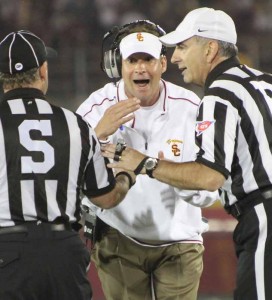Official ruling leads to post-game controversy
USC coach Lane Kiffin said he was “extremely disappointed” with the way officials handled the timing dispute during the last play of regulation Saturday.

Upset · USC coach Lane Kiffin said he was told by an official he would be allowed to call a timeout with one second remaining in the fourth quarter. - Carlo Acenas | Daily Trojan
With nine seconds left and the game tied at 31 in the fourth quarter, USC had the ball on the Stanford 40-yard line.
USC ran one more play: a designed slip-screen for sophomore wide receiver Robert Woods, who was to take the ball quickly upfield to get a few more yards so the Trojans could call timeout to attempt a more manageable game-winning field goal.
Instead, Woods broke the play off toward the Stanford sideline, seemingly racing to get out of bounds despite the fact USC still had two timeouts remaining. He appeared to fall out of bounds with one second left, but the ruling on the field was that the clock ran down to zero and that the game would head to overtime.
“They said he was out of bounds [but] he wasn’t out of bounds,” Kiffin said. “So I told them, ‘When the replay comes back, you’re going to say his knee’s down.’”
Replays did show that Woods’ knee was down inbounds with one second left.
“I said [to the side judge], ‘You’re gonna review this,’” Kiffin said. “You’re gonna come back out and say y’all screwed up; he wasn’t out of bounds, his knee was down. Then you’re gonna say there’s one second on the clock. You gotta tell him [the referee] that we called a timeout here.”
According to Kiffin, the side judge told him that if the video review determined there was one second left on the clock, he would be granted a timeout.
The ball would have been placed on the Cardinal 33-yard line, leaving freshman kicker Andre Heidari with a 50-yard field goal attempt and a chance to win the game.
Heidari had hit from that same distance at the end of the second quarter.
“And they come back over and completely went against it,” Kiffin said. “So I’m extremely disappointed in that. That’s not an opinion, I’m not complaining about it. I’m just giving you the exact facts of the situation. Really disappointed in that.”
But referee Michael Batlan’s version of events differed from Kiffin’s.
“Through review, it was seen that the knee was down and time had expired and therefore we were headed to an overtime period,” Batlan said. “Any coach can ask for a timeout, but he doesn’t get one until an official grants or signifies it. I was not part of any conversation with regards to a requested timeout.”
Kiffin said he was told by an official that “if there was one second, [be] wouldn’t have had enough time to call a timeout,” a statement with which Kiffin strongly disagreed.
“I’ve been around football a long time,” he said. “You call timeouts with one second [left] all the time. It’s what you do, you call a timeout when the guy’s knee hits the ground and you get the play run.”
Quick hits
– Attendance was announced at 93,607, marking the first sellout at the Coliseum since a 2009 game against Oregon State. Through five games this season, USC has averaged 73,056 fans per game.
– Saturday’s triple-overtime contest was also USC’s first overtime game since Sept. 27, 2003, when it lost at California 34-31 in triple overtime. The Trojans are 3-6 all-time in overtime games.

Cheaters NEVER prosper.